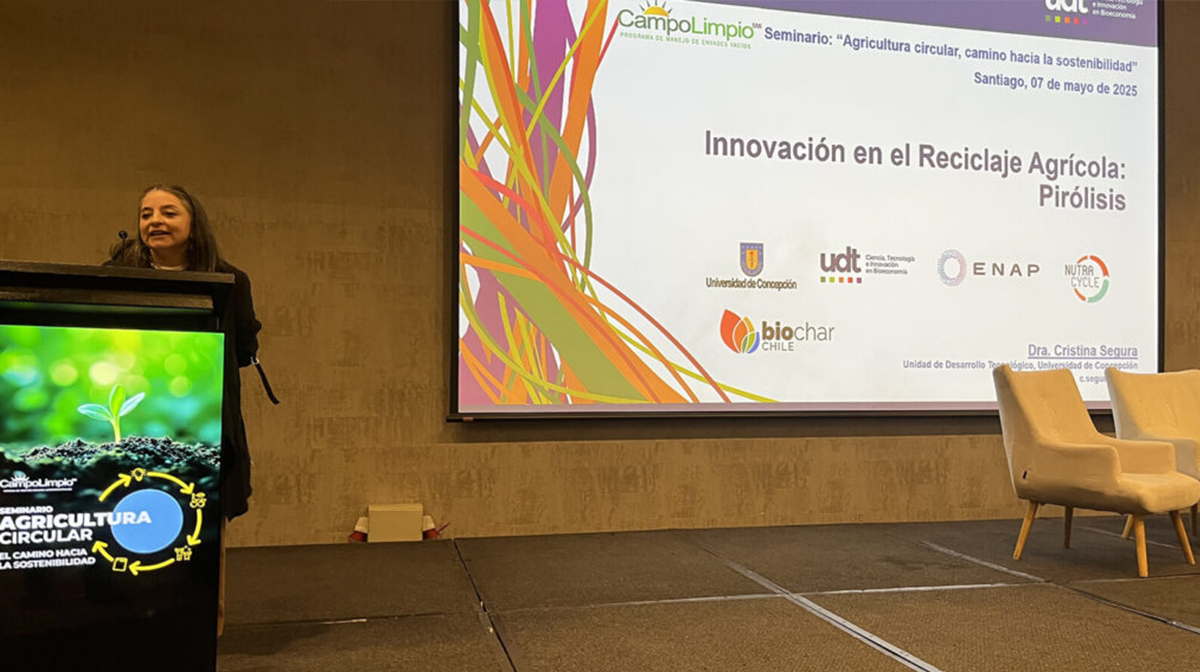In the framework of the seminar “Circular Agriculture, the road to sustainability”, organized by CampoLimpio last Wednesday, the researcher Dr. Cristina Segura, from the Technological Development Unit (UDT) of the Universidad de Concepción, presented the talk “Innovation in agricultural recycling: Pyrolysis”, where she addressed new alternatives to valorize plastic waste that is difficult to recycle mechanically, particularly those from the agricultural sector.
In a clear and detailed presentation, Segura introduced pyrolysis technology, a thermochemical process that, by means of high temperatures in the absence of oxygen, allows the decomposition of plastics such as polyethylene and polypropylene into useful products, such as paraffin waxes and liquid fuels. Unlike incineration or traditional mechanical recycling, pyrolysis makes it possible to recover materials even when they are contaminated with labels or other compounds, which opens up new possibilities for post-consumer agricultural plastics, usually excluded from the recycling cycle.
During her presentation, the researcher contextualized the challenge: in Chile more than 1.3 million tons of plastic are consumed each year, but less than 10% is recycled. The REP Law seeks to raise this figure to 45%, which implies a profound transformation in the management of plastic waste. In this scenario, technologies such as pyrolysis become relevant.
Segura presented international examples of companies that process complex plastic waste on a large scale with pyrolysis. However, he clarified that the approach developed by UDT seeks to adapt to the Chilean context. “We think a little differently here,” she said, noting that they have focused their efforts on obtaining waxes that can replace imported inputs in industries such as the panel industry, which currently use paraffinic emulsions of foreign origin.
The researcher explained that, thanks to samples of high density polyethylene containers sent by CampoLimpio, tests were carried out in the laboratory of the Technological Development Unit (UDT), using pyrolysis technology. The results were promising: a high quality paraffin wax was obtained, with low oil content – ideal for industrial applications – as well as a liquid fuel with properties similar to diesel, although still in the process of optimization. This work is part of a broader line of research being carried out at UDT’s pilot plant in Coronel, where plastic waste is processed through an integrated sequence of extrusion, pyrolysis, condensation and separation. Currently, this experience is laying the groundwork for new developments: UDT is collaborating with ENAP and Nutracycle in the production of sustainable aviation fuels (SAF) from recycled plastics, thus contributing to the national goal of decarbonization of air transport.
The talk ended by highlighting the potential of this technology to drive a real circular economy in agribusiness and other sectors, transforming waste into resources and generating value at the local level. “We continue to look for application niches, because what we want is not only to recycle, but also to replace imported products with sustainable national solutions,” Segura concluded, thanking CampoLimpio for the invitation and valuing the opportunity to share scientific advances with actors in the agricultural sector.
Source: CampoLimpio

